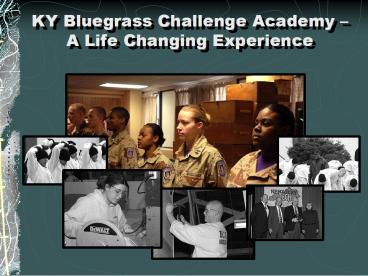KY Bluegrass Challenge Academy A Life Changing Experience
1 / 5
Title:
KY Bluegrass Challenge Academy A Life Changing Experience
Description:
At first glance, the Bluegrass Challenge Academy appears ... Elmo C. Head,COL.(US Army Ret.) is the director of the program and has been since its inception. ... –
Number of Views:440
Avg rating:3.0/5.0
Title: KY Bluegrass Challenge Academy A Life Changing Experience
1
KY Bluegrass Challenge Academy A Life Changing
Experience
2
At first glance, the Bluegrass Challenge
Academy appears to be boot camp rather than a
learning facility. Its located at Fort Knox,
the students dress in fatigues or sweat suits and
drill instructors are everywhere.
A closer look shows something completely
different. Along with the military atmosphere, a
learning environment exists. Academic classrooms
are complete with books and computers while a
technical education facility is full of heating,
ventilation, and air conditioning electricity
carpentry plumbing and masonry materials.
The academy is part of a project developed for
at-risk youths between 16 and 18 years of age.
The cadets must be high school drop-outs, drug
free and without a felony record to attend. They
must be physically and mentally able to complete
the program, as well as a US citizen and resident
of Kentucky. The program got its start duri
ng the 1998 Session of the Kentucky General
Assembly. An executive order was issued
creating the Kentucky National Guard Youth
Challenge Division in the Department of Military
Affairs.
3
The main objective of the program is to get
students ready to satisfactorily complete their
GED certification while learning job skills,
citizenship, community service and the attributes
of becoming leaders and followers.
Recruitment is conducted through many
different networks including local civic leaders,
school superintendents, directors of pupil
personnel, presentations to high school
administrators, National Guard Recruiting Command
and various media outlets. Once accepted, c
adets must go through a two-phase system adopted
by the academy in order to graduate. The first
is a 22-week residential, military-style phase.
They live at the base and participate in physical
fitness training, academic and technical
education classes, counseling and other
life-skills programs. Once the first phase has
been completed, a one year follow-up phase is
implemented to provide a secure network of
support for the individual. This time is used to
help graduates further their education or find
employment in the workforce.
Cadet Meghan Chapman, a current student at
the academy said I think its a tough program,
but a great one. I didnt want to be here at
first but, school wise, I see more opportunity
for me. I feel like the staff really cares for
us here.
4
The cadets also participate in a mentoring
project throughout the program. Either through
someone they know or through the help of someone
at the academy, a mentor is chosen by each cadet
and helps to serve as a role model. All mentors
must pass a background check before being
accepted. Participation in the program is st
rictly voluntary. Participants have the freedom
to leave anytime during the cycle.
Elmo C. Head,COL.(US Army Ret.) is the
director of the program and has been since its
inception. According to Head, two to three
million youths nationally will drop out of school
this year -- 20,000 in Kentucky alone. Of
those, 60 will end up in the justice system.
The problem is big and bad, but taxpayers
can save 1.5M per kid if we can turn them around
now in a program like this, said Head. Im
going to help any kid that wants help.
Colonel Head receives his special Kentucky
Department for Technical Education Commissioners
Award. From left to right Emil S. Jezik, DTE
commissioner Allen D. Rose, WFD cabinet
secretary Colonel Head and Mary A. Stratton,
DTE deputy commissioner.
5
Currently 34 states have similar programs in
operation. In Kentucky, a total of 867 cadets
have enrolled in the seven cycles that have been
conducted thus far. Of those, 488 have graduated
with 299 earning GED certification and 196
earning college credits. Future expansion plans
call for two more facilities to open, enrolling
up to 2,000 students annually.
Funding is provided through a 60/40 split of
federal and state dollars. The technical
education pilot components have and will continue
to be paid using federal incentive funds from
July 1, 2002 to June 30, 2004. Kentucky received
these funds by meeting all goals associated with
the Carl D. Perkins Vocational and Technical
Education Act of 1998. The program has been
well received throughout the state and Colonel
Head was recently awarded the Kentucky Department
for Technical Educations prestigious
Commissioners Award for 2002. The award goes to
a business, government entity, nonprofit/
voluntary organization and/or an individual that
acts as an example to others and demonstrates
creative solutions that meet community needs, is
actively involved in the design and
implementation of the program and produces a
measurable benefit.
KY Tech News Flash 17 March 10, 2003
Click on logo to go to KY Tech Home page































